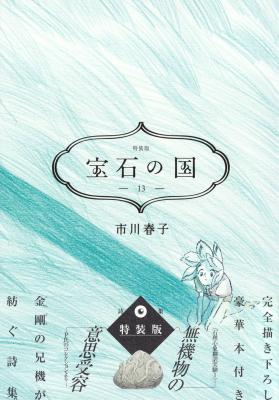Commenting on this manga would be a long endeavor. Houseki no Kuni was a great personal surprise for me — a story that simmers slowly, only to explode in its final arcs with a depth far greater than it first appears.
Houseki no Kuni is a profound reflection on the dilemma of the “self.” The story of Phosphophyllite (Phos) confronts us with existential questions: What makes us who we are? What is our essence when everything changes? Throughout the work, Phos undergoes multiple physical, mental, and emotional transformations, yet still retains a spark of their original being — the desire to be happy, to feel loved, and to find peace. That persistence of the soul, even amid constant metamorphosis, is what sustains their authenticity.
However, this search is not without pain. Phos suffers from deep identity disorders after losing parts of their body — and with them, their memories and history — facing loneliness and existential disorientation. The emptiness that surrounds them becomes the catalyst that forces Phos to confront their true self, their darkest desires, and their own destiny.
From a philosophical perspective, Phos reflects Jean-Paul Sartre’s existentialism: the attempt to give one’s life purpose, a reason to exist. But their journey also intertwines with Nietzsche’s nihilism, as Phos destroys the values imposed by their master and peers, seeking to attain a new way of being. In their process of self-destruction, Phos embodies the idea of amor fati — to accept and love one’s own fate — and a kind of fatalism that embraces suffering as a path to spiritual maturity.
As they strip away their “humanity,” Phos becomes a stoic being, striving to endure adversity and find meaning through sacrifice. Their path leads them to accept change, no matter how harsh or painful, with the goal of achieving a purer form of existence, even if it means losing their former identity.
In dialogue with John Locke and his metaphysics of identity, the story suggests that “we are our memories.” If identity is made up of memories and experiences, then Phos — by losing parts of their body and mind — also loses fragments of themselves. That loss leads to madness and the disintegration of consciousness, transforming Phos into a new being, yet one alienated from their original “self.”
Phos’s constant transformation can also be understood through Alfred North Whitehead’s view of reality as fluid and ever-changing. Phos experiences that fluidity through countless metamorphoses — external and internal changes that reshape their morality, ethics, and worldview. This dynamic also echoes Hegel’s dialectic, in which every contradiction gives rise to a new synthesis. Thus, Phos continuously reinvents themselves: every loss or failure becomes an opportunity to surpass their previous self and be reborn with a deeper, more fitting understanding of reality.
Finally, when Phos says, “There’s a bridge I must burn,” it represents the act of breaking away from regret and embracing complete commitment to one’s fate. The phrase symbolizes the stoic and deterministic acceptance — inspired by Marcus Aurelius — that the chosen path must be walked without looking back. By burning their “ships,” Phos accepts their role as the bridge toward a new existence, the transition between the human and the divine, between suffering and nirvana.
Notes:
Story: 9.4
Art: 9.5
Characters: 8.4
Enjoyment: 10
9.3/10 ⭐





